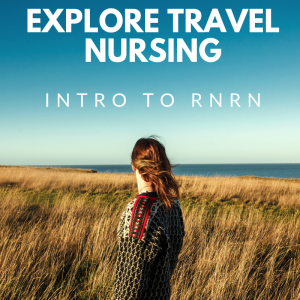Start here to launch your travel nursing career. We’ll take you through each step from getting licensed to starting your first job.
These are the five steps to becoming a travel nurse:
1. Become an RN and build 1-2 years of experience
You’ll want to choose a specialty and complete relevant certificates that increase your chances of getting a job like the CNOR for operating room nurses or the CCRN for the ICU.
2. Learn the basics of travel nursing
There are many differences like the application process, salary packages, housing and meal stipends, the tax implications, and more.
3. Apply for your first job
This involves choosing a location, connecting with agencies, reviewing offers, and transferring your license.
4. Get ready to go
Because you’re traveling and working, there’s a lot of prep work that has to be done from finding housing to planning the fun parts.
5. Day one on the job
You’ll be expected to hit the ground running so you’ll want to know what to expect from training and orientation.
You can work while exploring a new place and enjoy a more flexible lifestyle. Where you go and when you go is totally up to you. Travel nursing is also a great way to advance your career because you can travel to where the best opportunities are. Plus, you can get paid more–travel nurses tend to earn higher compensation than staff nurses.
Want to learn more?
??⚕️ Become an RN and build 1-2 years of experience
? Graduate and pass the NCLEX
As you might have guessed, the first big step in your travel nursing journey is obtaining an active RN license.
If you’re licensed, then congrats! The hardest part is over, you can jump ahead.
If you’re an LPN or CNA looking to pursue an RN degree, here’s a breakdown of nursing degrees and levels. While a BSN or higher can unlock many opportunities, it isn’t required for travel nursing. An associates degree (ADN) and 1-2 years of experience is sufficient for most entry-level positions.
? Choose a specialty
You will need 1-2 years of recent experience in a specialty to be hired as a travel nurse.
Specialties that require a broader skillset and more technical expertise like Intensive Care Unit, L&D, and Operating Room can often pay more, but you can also earn similar compensation in more general roles like med-surg or telemetry.
These are some of the top paying medical specialties for travel RN’s:
Top 10 highest paying states for Travel RN jobs last year
| State | Avg Weekly Salary | Max Weekly Salary |
|---|---|---|
| California | $2,065 | $4,341 |
| New Jersey | $1,888 | $3,432 |
| District of Columbia | $1,857 | $3,380 |
| Rhode Island | $1,831 | $2,608 |
| Alaska | $1,823 | $2,937 |
| New York | $1,778 | $3,228 |
| Connecticut | $1,773 | $3,250 |
| Massachusetts | $1,773 | $3,530 |
| Washington | $1,768 | $3,312 |
| North Dakota | $1,764 | $2,899 |
? Land your first staff job
It takes hustle to get your first nursing job, but you’ll get there!
Look for facilities with a nurse residency program or an orientation designed specifically for new graduates. Nail the job you want by talking up your ability to learn quickly, interact with patients, and be part of the unit team. Most importantly, be willing to adapt to the needs of the facility.
Once you are on staff, get involved on your unit and join committees. Don’t burn bridges–you’ll need great references from your employer to travel. Focus on the now and be present so you can be an awesome travel nurse later on.
? Learn the basics of travel nursing
✈️ How travel nursing differs from staff nursing
The biggest differences between travel and staff nursing are the expectations, the process, and the pay.
Because travel nurses work shorter assignments, you’ll be expected to start in a unit with minimal orientation. When applying for jobs, you’ll likely work with a recruiting agency so the process is a little different. Finally, you’ll need to be well-versed in travel nurse pay so you can compare the opportunities in front of you.
Everything you need to know about travel nurse compensation and taxes
Travel nurse compensation is structured differently, and in many cases, you can expect to earn more than a staff nurse.
Unlike staff positions, travel nurses are often eligible for tax-free stipends that cover housing, meals, and incidentals in addition to a base salary. You’ll need to crunch the numbers because a slightly lower base salary can be offset by tax-free stipends that lead to a higher overall compensation.
These three guides will help you understand everything you need to know about travel nurse pay:
- Travel Assignment Pay Package Breakdown
- Understanding Travel Nursing Tax Rules
- Travel Nursing and Bill Rates
Average gross weekly pay: $1,543
Max gross weekly pay: $3,345
Average non-taxable compensation: $1,388
Average hours per week: 36
Salary and benefit estimates are based on NurseFly data of over 175,000 listings for US travel RN jobs in 2019.
? Transferring your license: it’s easier than you think
Many travel nurse jobs require you to have a license in-hand in order to apply. Don’t worry, we got you.
Your first step will be to understand the requirements for the state where you are applying, which can be found on the state’s board of nursing website. Make sure to search for “licensure by endorsement” so you’re not applying to take the NCLEX again.
At a minimum, you’ll need to complete a background check, verify your current license, and provide state-issued identification. Here are some tips on staying organized.
States handle license transfers in different ways, here are some examples:
- Single state license: Apply to for licensure endorsement outside of your homes state–is often the lengthiest process and requires sending multiple pieces of documentation
- Compact license: If you have a permanent residence in a “Compact state”, you can work in any other compact state
- Walk-through state license: You can arrive in these states and receive a temporary license in just a few days
We cover all of these in detail in our best practices for travel nursing and licensing guide.
PRO TIP: Most travel nurse agencies will reimburse you for all of the associated costs for obtaining a license. You can negotiate this in your contract with your recruiter.
? What’s a recruiting agency? Should I work with one?
A travel nursing agency simply helps connect travel nurses with travel nurse jobs, and the short answer is, Yes!
These days It’s almost impossible to find a travel nursing assignment without being associated with an agency so it’s good to build these relationships. In many cases, you’re actually employed by the recruiter, not the facility itself so they’ll manage your compensation, travel, and benefits. You can learn more about how agencies contract with facilities in our blog on bill rates and travel nursing.
Compare agencies and read reviews on NurseFly or see our guide on agencies and recruiters.
? Applying for your first job
? Choose a location and start exploring jobs
Narrow down your options to a few locations and start browsing jobs with NurseFly. Make sure your resume is up to date, and complete your profile to apply for jobs more easily. Check out our city guides or use our location explorer tool to search locations by region, cost of living, city size, and even nightlife or weather.


? Connect with an agency: here’s how to choose a good one
Agencies work on your behalf to place you in the right job, but not all agencies are created equal.
We have a lot of tips for finding the right agency, but first and foremost, you want to make sure they offer the types of jobs you’re looking for and in your desired location.
When talking to a recruiter, here are some of the important things to ask:
- What are the benefits and what expenses are reimbursed or covered by the agency as part of the onboarding and transition process? A contract should compensate you for any prerequisites like physicals, drug screens, and fit testing.
- If you are thinking about taking agency provided housing, ask what is included. Utilities? Linens? Kitchenware?
- Does the agency have overtime or extra hours pay policy, or is it facility-specific?
- What agency paperwork is required? Usually, a resume, references, and skills checklists are the minimum requirements. Confirm there aren’t any extraordinary or unexpected conditions to sign a contract with the agency.
- Will you be working with one or multiple travel nurse recruiters? And how many other travel nurses is the travel nurse recruiter assisting?
See more top questions in our guide on what to ask your travel nurse recruiter.
? The application: what to expect and how to make it easier
Applying for a job doesn’t have to feel like a job.
When applying for your first job start by perfecting your travel nurse resume. Having a NurseFly profile will make the application process much easier. Instead of filling out hundreds of job applications, you just create a single profile and let the offers come to you. You can also explore jobs and chat with employers directly, all in one place.
The next step will be to prepare for interviews. Practice talking through your experience and share examples of how you can be adaptable, accommodating, and willing to learn the methods of the facility. Hospitals want to know that you’re committed and capable of hitting the ground running.
? Compare and negotiate offers
Avoid applying to the same facility with multiple agencies. Compare offers for facilities in the area and choose the one that best meets your location, salary, and shift preference. If you are claiming a permanent tax home, you’ll want to compare your base salary and tax-free stipends for each package offered to you. Expect the hourly wage to be comparatively low, but don’t worry, this works in your benefit. Travel pay can be complex, and you can read more about it in our posts that explain pay packages, bill rates, and travel nurse taxes.
? Getting ready to go
? Find housing like a pro
Since travel nursing jobs are usually posted 6-8 weeks before the start date, you often only have a short amount of time to secure housing.
Housing for travel nurses can be provided by the agency, but you may be able to save some money by finding your own housing. Don’t forget about furnishing, appliances, and potential roomates. There are plenty of tools to find short term housing, and we’ve got you covered with housing tips and tricks for travel nurses.
| Category | Items to Consider |
| Location | Public transportation, free or paid parking, garage access, distance from the hospital, proximity to necessities like grocery and gas |
| Utilities | If not included, costs of cable, Wifi, hot water, type of heat and average bill, central air, trash, sewer. |
| Amenities | Linens, kitchenware, cleaning supplies, toiletries, towels, outdoor space etc. |
| Appliances | Microwaves, washer/dryer (paid or in unit?), dishwasher, TV, air conditioner |
| Roommates | Quantity, gender, age, shifts worked, house rules, common areas, shared bathrooms, short term/long term (ensure the other rooms aren’t an Airbnb like situation) |
| Fees | Security and initial deposits, pet associated costs, refundable vs nonrefundable fees. |
Some helpful housing tools to use:
- travelnursehousing.com
- Furnishedfinder.com
- Sonder.com
- Airbnb
- VRBO
? Plan your journey and pack smart
It can seem overwhelming, but it’s also part of the excitement.
You’ve got the job and now you’re ready to plan your adventure. From choosing what to bring, how to pack, and how to get there, you’ve got a lot on your mind. We’ve got the full check-list for preparing for your first assignment.
? Travel nursing apps that make it easy
Manage your schedule, travel smarter, and maximize the experience!
Here are some of our favorite travel nursing apps:
- NurseFly (yes we’re biased): Join a community of travel nurses, explore thousands of jobs, and connect with employers directly
- Nurse Grid: See schedules from home and request swaps with co-workers
- Culture Trip: great recommendations for tourist sites, museums, food, and much more in cities all over the world
- Spot Hero: Super helpful in big cities where parking is often expensive and hard to find.
- Road Trippers: Explore great road trip itineraries or plug in your departure location and destination to find cool sites, historic landmarks, and rest-stops along the way.
?⚕️ Day one on the job
? You made it! Here’s how to be successful from start to finish.
Take advantage of orientation and training
You will likely be asked to complete online onboarding for your agency prior to arriving at the facility. This usually includes uploading all of your certifications, an online orientation, and prework for your unit. The onboarding will also usually require a physical within the past year, proof of immunization, and a urine drug screen. If you need help with the process, reach out to the onboarding specialist at your agency for assistance!
It’s common for travel nurses to receive only 1-2 days of clinical orientation, sometimes even less. Be ready to hit the ground running. This is what you’ve been preparing for!
Dos and Don’ts on your first assignment
✔ Nail the basics: be punctual, be present, and make friends!
✔ Focus on learning how the facility operates, how the team divides responsibilities, and how you can plug in to make the team more efficient.
✔ Get involved and look for opportunities to gain new skills – A good travel nurse makes it better and easier for other travel nurses that may follow them at a facility.
X Avoid challenging systems and core staff early-on. You are there to help out, not rebuild the unit or fix all the problems.
X Don’t be afraid to ask for help. If you’re not sure how to handle something, it’s worth the extra time to ask. Little mistakes can quickly become big mistakes that create more work for other people.
Extending your contract and finding your next job
After you complete your first assignment, you may love it so much you want to stay! If you think this may be the case, let your recruiter know ASAP to ask for an extension.
Facilities that use a lot of agency and travel nurses to supplement their staffing with usually offer an extension of your contract if you are doing a good job. If you like where you are at, discuss extending with your nurse manager to see if that is an option.
Otherwise, hop on NurseFly and start searching locations for your next adventure
? Congrats! Now you’re a seasoned travel nurse with the knowledge to share and stories to tell.
Travel Nurse FAQs






